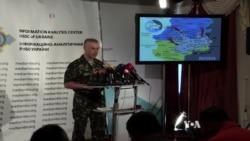The downing of the Malaysian airliner two weeks ago, and allegations that Russians are shelling Ukrainian troops across the border, have moved the information war swirling around the Ukrainian conflict to a new level.
Ukraine's national security spokesman gives two briefings a day, reporting advances by Ukrainian troops against Russian-backed separatists in the east, and accusing Russian troops of shooting across the border.
Russia denies the allegations, and blames Ukraine for the increased fighting, and even for downing the Malaysian airliner, which Ukraine and the West blame on the separatists or Russian operatives.
The dueling information can be intense. But even at a Kyiv church that is sometimes a gathering place for pro-Russian crowds, most people are clear about whom they believe.
"Only Russian people are believing Russian media because it's special media from [the] KBG. But our people know exactly [the] true things," said one woman.
"Of course I believe my president. I believe our new government. Of course I want to live in new Ukraine," said another.
But a man, who just arrived from the conflict zone in eastern Ukraine, is not so sure.
"It's hard to tell because I'm from Donetsk. There are only Russian programs on the television there. Now I came see my son in Kyiv and there are only Ukrainian programs," he said. "How can I compare them? I haven't been in the military action. How can I say who to believe?"
There is a dizzying array of information available, much of it through traditional media but also a lot of it online and on television.
News agent Irina works at a newstand in a commuter train station under Independence Square, site of that revolution that brought the new president to power. She says the revolution changed what her customers are looking for.
"Most of the people buy our Ukrainian newspapers. Russian newspapers are not selling so well. I still sell some, but fewer than before. Now, its mostly ours," she said.
Depending on whom you believe, the Ukrainian revolution was either the flowering of democracy or the imposition of fascism and decadence; and the Russian annexation of Crimea and involvement in eastern Ukraine are either brutal violations of international law or the noble protection of Russians and their rights.
"In this year and last year, we see that mass media changed the reality," said information consultant Dmitri Zolotukhin. "Who [ever] has influence on the mass media, he has influence on the reality. If you want, reality to be like full of fear, full of hate, then you just take this mass media and change the reality the way you want it."
The events in Ukraine in recent months have been dramatic, but Zolotukhin says how people on all sides perceive those events will be equally important in determining the country's future - and its future relationship with its large, powerful neighbor to the east.





